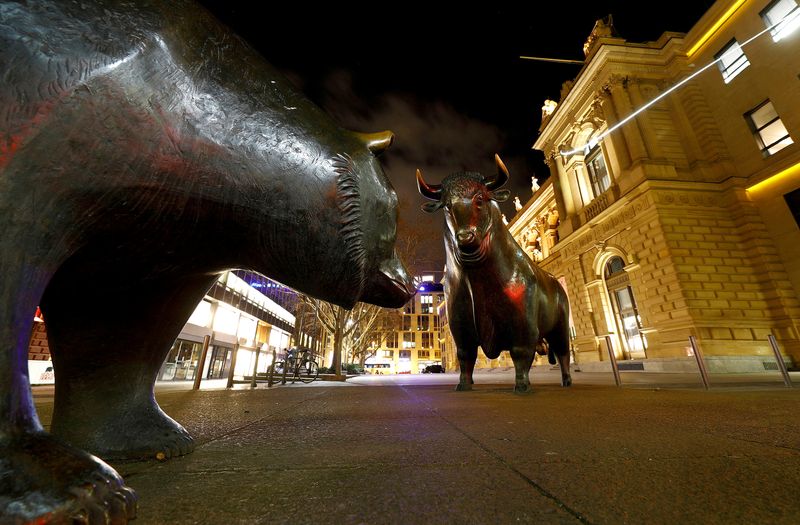Select Language

By Joice Alves
LONDON (Reuters) - Big European companies have delivered significantly stronger than expected first-quarter results, defying a challenging economic backdrop that includes surging inflation and rising interest rates.
But European stocks are down from a 14-month high in April, as investors worry about the health of the global economy, falling customer demand and pressures building on profit margins.
About half of the STOXX 600 companies have reported first-quarter results and two thirds of them exceeded estimates, a stronger performance than in most quarters when about half of companies typically beat earnings estimates.
"It's still the case, that a resilient consumer, supported by excess savings and a strong labour market continues to absorb higher prices and support corporate profitability," wrote Bernstein strategists Mark Diver and Sarah McCarthy.
While banks had to be rescued in the United States and in Switzerland, first-quarter results from the euro zone's biggest bank BNP Paribas (OTC:BNPQY), British lender Barclays (LON:BARC) and Germany's biggest bank Deutsche Bank (ETR:DBKGn) all beat forecasts.
Consumer group Nestle and the maker of Dove soap and Ben & Jerry's ice cream Unilever (NYSE:UL) reported stronger than expected results as price increases offset lower volumes.
Europe's largest listed company LVMH produced stellar sales as China rebounded sharply after COVID restrictions ended.
Earnings at STOXX 600 companies are currently expected to grow 7.3% in the first quarter, a big turnaround from a 2.5% decline expected only four weeks ago, based on Refinitiv I/B/E/S data.
But the pan-European stock index is around 7% below a record peak hit in January 2022, before the Ukraine invasion.
It is trading about 1% lower since the start of the earnings season when it hit its highest since February 2022 following a spurt supported by China's post-COVID reopening and declining energy prices. The current declines are broadly in line with global markets.
BofA said European equities have seen nine straight weeks of outflows.
'CLOUDS ON THE HORIZON'
Last week, JP Morgan downgraded euro zone stocks to "underweight" highlighting that they had already gained 30% against the U.S. since their lows touched in September.
"(Strong earnings season) was not enough to bring global markets to make new highs probably due to the clouds that are still present on the horizon," said Luca Finà, head of equity at Generali (BIT:GASI) Insurance Asset Management, mentioning rising cost of capital and default risks of the U.S. debt ceiling.
The robust corporate margins on show in the first quarter are seen coming under pressure later in the year.
Based on Refinitiv I/B/E/S estimates, STOXX 600 companies are expected to report net profit margins of 11.4% in the first quarter, up from 10.2% in the last quarter of 2022.
But margins are seen declining to 10.5% in the third quarter, according to Refinitiv estimates.
"(If) Q1 sets an example for 2023, sales growth could remain resilient, but margins will have a hard time improving in this context of higher (interest) rates," said Florian Ielpo, head of macro at multi asset group Lombard Odier Asset Management.
"Higher rates mean higher funding costs and lower CAPEX at the moment, and eventually it will mean a lower demand, declining sales and a lower pricing power as the consumer end will come under pressure," he said.
New data from China shows inflation has flatlined and imports have declined, clouding the outlook for the global economy.
Analysts also flagged that consumers across Europe, who have so far coped with the cost-of-living squeeze better than many expected, could eventually run out of savings.
Cyclicals delivered the bulk of the EPS beats, led by industrials and consumer discretionary, Barclays said.
The European Commission said on Monday it expects euro-zone inflation, currently at 7%, to remain stubbornly high this year, with economic growth forecast at 1.1% this year and 1.6% in 2024.
Europe's largest technology company ASML Holding (NASDAQ:ASML) NV beat earnings forecasts but noted some signs of caution among customers.
Telecoms group Vodafone (NASDAQ:VOD) plans to cut 11,000 jobs over three years after it warned that a poor performance in its biggest market Germany would hit cash flow.
But there has not been a wave of companies revising earnings forecasts down, providing a cushion for European equities.
"Guidance has been less positive in Q1 but there has been no material rise in percentage of firms guiding lower," Barclays said.

